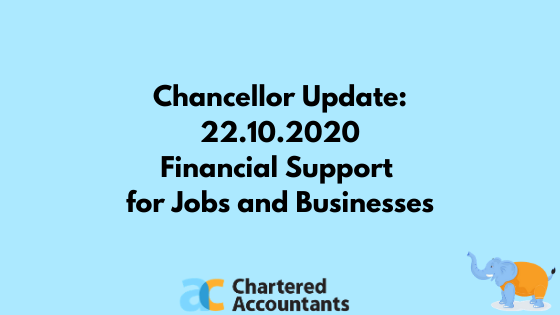
Today, the Chancellor has announced further financial support for businesses during this time. These include:
– Open businesses which are experiencing considerable difficulty will be given extra help to keep staff on as government significantly increases contribution to wage costs under the Job Support Scheme, and business contributions drop to 5%.
– Grants for the self-employed doubled to 40% of previous earnings.
– Business grants are expanded to cover businesses in particularly affected sectors in high-alert level areas, helping them stay afloat and protecting jobs.
Please see below for more information on these changes.
Job Support Scheme (JSS)
When originally announced, the JSS – which will come into effect on 1 November – saw employers paying a third of their employees’ wages for hours not worked, and required employers to be working 33% of their normal hours. Today’s announcement reduces the employer contribution to those unworked hours to just 5%, and reduces the minimum hours requirements to 20%, so those working just one day a week will be eligible.
That means that if someone was being paid £587 for their unworked hours, the government would be contributing £543 and their employer only £44. Employers will continue to receive the £1,000 Job Retention Bonus. The Job Support Scheme Closed for businesses legally required to close remains unchanged.
Self-employed grant
Today’s announcement increases the amount of profits covered by the two forthcoming self-employed grants from 20 per cent to 40 per cent, meaning the maximum grant will increase from £1,875 to £3,750.
The government will provide two taxable SEISS grants to support those experiencing reduced demand due to COVID-19 but are continuing to trade, or temporarily cannot trade. It will be available to anyone who was previously eligible for the SEISS grant one and grant two, and meets the eligibility criteria. Grants will be paid in two lump sum instalments each covering 3 months.
– The first grant will cover a three-month period from the start of November 2020 until the end of January 2021. The government will pay a taxable grant which is calculated based on 40% of three months’ average trading profits, paid out in a single instalment and capped at £3,750.
– The second grant will cover a three-month period from the start of February until the end of April 2021. The government will review the level of the second grant and set this in due course.
Business Grants
The Chancellor has also announced approved additional funding to support cash grants of up to £2,100 per month primarily for businesses in the hospitality, accommodation and leisure sector who may be adversely impacted by the restrictions in high-alert level areas. These grants will be available retrospectively for areas who have already been subject to restrictions, and come on top of higher levels of additional business support for Local Authorities moving into Tier 3 which, if scaled up across the country, would be worth more than £1 billion.
It will be up to Local Authorities to determine which businesses are eligible for grant funding in their local areas, and what precise funding to allocate to each business – the above levels are an approximate guide. Businesses in Very High alert level areas will qualify for greater support whether closed (up to £3,000/month) or open. In the latter case support is being provided through business support packages provided to Local Authorities as they move into the alert level.
The government is working with local leaders to ensure the Alert Level very high packages are fair and transparent.
This is currently all the information we have. When we know more we will keep all of our clients up to date.
Need more information?
Does your business need support through the coronavirus? We are helping our clients old and new during this time. We offer a wide range of services which are unique to your business and work in a broad range of sectors, from construction and property to the charity sector. Our team work hard to ensure they create smart and effective tax-efficient solutions for start-ups to optimise growth and help them succeed. If you want to learn more about how the team can help or simply want some start-up advice from a trusted accountant do hesitate to contact us. For more information please do hesitate to contact us on 0161 962 1855. Alternatively you can email us using the form below and we will contact you as soon as possible.
Our fantastic team at A&C Chartered Accountants are here to help.









